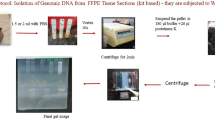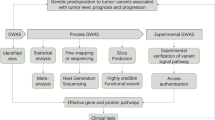Abstract
The present study was conducted (1) to examine whether the GSTT1- and GSTM1-null genotypes are risk factors for bladder cancer, and (2) to study possible association of tobacco usage and age strata with genotype of these patients. This case control study was undertaken over a period of 19 months and included 106 bladder cancer patients and 182 controls; both patients and controls originated from northern part of India. The GSTT1 and GSTM1 genotypes were identified by multiplex PCR in peripheral blood DNA samples. Genotype frequencies among patients and controls were assessed and the association of the genotypes with smoking habits and gender of the patients were statistically determined by the χ2 test. Frequencies of null genotypes in GSTT1 and GSTM1, were 16% (29/182) and 30% (54/182), respectively, in control individuals. The frequencies of GSTT1- and GSTM1-null genotypes in bladder cancer patients were 26% (28/106) and 40% (42/106), respectively. In conclusion, our study demonstrated that the null genotypes of GSTT1 and GSTM1 were substantially at higher risk for bladder carcinoma compared to the normal healthy controls. The GSTT1- and GSTM1-null genotypes did not show significant association with tobacco usage in bladder cancer patients. However, the null genotypes were statistically significant in female relative to male bladder cancer patients.

Similar content being viewed by others
References
Abdel-Rahman SZ, Anwar WA, Abdel-Aal, Mostafa HM, Au WW (1998) GSTM1 and GSTT1 genes are potential risk modifiers for bladder cancer. Cancer Detect Prev 22:129–138
Bell DA, Taylor JA, Paulson DF, Robertson CN, Mohler JL, Lucier GW (1993) Genetic risk and carcinogen exposure: a common inherited defect of the carcinogen metabolizing gene glutathione S-transferase M1 that increases susceptibility to bladder cancer. J Natl Cancer Inst 85:1159–1164
Brockmoller J, Kerb R, Drakoulis N, Staffeldt B, Roots I (1994) glutathione S-transferase M1 and its variants A and B as host factors of bladder cancer susceptibility: a case control study. Cancer Res 54:4103–4111
Brockmoller J, Cascorbi I, Kerb R, Roots I (1996) Combined analysis of inherited polymorphism in arylamine N-acetyltransferases, glutathione S-transferases M1 and T1, microsomal epoxide hydrolase, and CYP 450 enzyme as modulator of bladder cancer risk. Cancer Res 56:3915–3925
Buch SC, Notani PN, Bhisey RA (2002) Polymorphism at GSTM1, GSTM3 and GSTT1 gene loci and susceptibility to oral cancer in an Indian population. Carcinogenesis 23:803–807
Georgiou I, Filiadis IF, Alamanos Y, Bouba I, et al. (2000) Glutathione S-transferase null genotypes in transitional bladder cancer: a case control study. Eur Urol 37:660–664
Golka K, Reckwitz T, Kempkes M, Cascorbi II, Blaszkewicz M, Reich SE, Roots II, Soekeland J, Schulze H, Bolt HM. (1997) N-Acetyltransferase 2 (NAT2) and glutathione S-transferase M1 in bladder cancer patients in a highly industrialized area. Int J Occup Environ Health 3:105–110
Guengerich FP, Thier R, Persmark M, Taylor JB, Pemble SE, Ketterer B (1995) Conjugation of carcinogen by theta class glutathione S-transferase; mechanism and relevance to variations in human risk. Pharmacogenetics 5:S103–S107
Hirvonen A, Nylund L, Kociba P, Husgafvel-Pursiainen K, Vainio H (1994) Modulation of urinary mutagenicity by genetically determined carcinogen metabolism in smokers. Carcinogenesis 15:813–815
Katoh T, Inatomi H, Kim H, Yong M, Matsumoto T, Kawamoto T (1998) Effect of glutathione S-transferase GSTM1 and GSTT1 null genotypes in urothelial cancer risk. Cancer Lett 132:147–152
Kempkes M, Golka K, Reich S, Reckwitz T, Bolt HM (1996) Glutathione S-transferase M1 and T1 null genotype as potential risk factor for urothelial cancer of the bladder. Arch Toxicol 71:123–26
Ketterer B, Harris JM, Talaska G, et al. (1992) The human glutathione S-transferase supergene family; its polymorphism, and its effects on susceptibility to lung cancer. Environ Health Perspect 98:87–94
Kim H, Kim W-J, Lee H-L, et al. (1998) A case control study on the effects of the genetic polymorphisms of N-acetyltransferase 2 and glutathione S-transferase M1 and T1 on the risk of bladder cancer. Korean J Prev Med 31:275–284
Kim WJ, Lee HL, Lee SC, Kim YT, Kim H (2000) Polymorphism of N-acetyltransferase 2, glutathione S-transferase M1 and T1 genes as risk factor of bladder cancer in relation to asthma and tuberculosis. J Urol 164:209–213
Kim WJ, Kim H, Kim CH, Lee MS, Oh BR, Lee HM, Lee HM, Katoh T (2002) GSTT1-null genotypes is a protective factor against bladder cancer. Urology 60:913–918
Lee SJ, Kang D, Cho SH, Kim SU, Park MS, Choi HY, Choi H (1999) Association of genetic polymorphism of glutathione S-transferase M1 and T1 and bladder cancer. J Korean Cancer Assoc 31:548–555
Lin HJ, Han CY, Bernstein DA, Hsiao W, Lin BK, Hardy S (1994) Ethnic distribution of glutathione S-transferase mu null genotype in 1473 individuals and application to bladder cancer susceptibility. Carcinogenesis 15:1077–1081
Ma QW, Lin GF, Chen JG, Shen JH (2002) Polymorphism of glutathione S-transferase T1, M1 and P1 genes in Shanghai population: patients with occupational bladder cancer. Biomed Environ Sci 15:253–260
Mannervik B (1985) The isozymes of glutathione S-transferases. Adv Enzymol 57:357–417
Nair UJ, Nair J, Mathew B, Bartsch H (1999) Glutathione S-transferase M1 and T1 null genotypes as risk factors for oral leukoplakia in ethnic Indian betal quid/tobacco chewers. Carcinogenesis 20:743–748
Pemble S, Schroeder KR, Spencer SR, Meyer DJ, Hallier E, Bolt HM, Ketterer B, Taylor JB (1994) Human glutathione S-transferase theta (GSTT1): cDNA cloning and the characterization of a genetic polymorphism. Biochem J 300:271–276
Perera FP (1997) Environment and cancer: who are susceptible? Science 278:1068–1073
Roy B, Chowdhury A, Kundu S, Santra A, Dey B, Chakraborty M, Majumder PP (2001) Increased risk of antituberculosis drug induced hepatotoxicity in individuals with glutathione S-transferase M1 ‘null’ mutation. J Gastroenterol Hepatol 16:1033–1037
Salagovic J, Kalina I, Stubna J, Habalova V, Hrivnak M, Vlansky L, Kohat A, Biros E (1998) Genetic polymorphism of glutathione S-transferase M1 and T1 as risk factor in lung and bladder cancer. Neoplasma 45:312–317
Sambrook J, Fritsch E, Maniatis T (1989) Molecular cloning—a laboratory manual, 2nd edn. Cold Spring Harbor Laboratory Press, Cold Spring Harbor NY
Shields PG, Bowman ED, Harrington AM, Doan VT, Weston A (1993) Polycyclic aromatic hydrocarbon–DNA adducts in human lung and cancer susceptibility genes. Cancer Res 53:3486–3492
Silverman DT, Rothman N, Devesa SS (1999) Epidemiology of bladder cancer In: Syrigos KN, Skinner DG (eds) Bladder cancer. Biology, diagnosis, management. Oxford University Press, New York, pp 11–55
Sreelekha TT, Ramadas K, Pandey M, Thomas G, Nalinakumari KR, Pillai MR (2001) Genetic polymorphism of CYP1A1, GSTM1 and GSTT1 genes in Indian oral cancer. Oral Oncol 37:593–598
Strange RC Jones PW, and Fryer AA (2000) Glutathione S-transferase: genetics and role in toxicology. Toxicol Lett 112–113:357–363
Vineis P, Simonato L (1991) Proportion of lung and bladder cancers in males resulting from occupation. Arch Environ Health 46:6–15
Weber WW (1997) Human drug metabolizing enzyme variants. In: Roberts Frazare JA, Carter CO (eds) Pharmacogenetics. Oxford University Press, London, pp204–210
Wiencke JK, Kelsey KT, Lamella RA, Toscano WA (1990) Human glutathione S-transferase deficiency as a marker of susceptibility to epoxide induced cytogenetic damage. Cancer Res 50:1585–1590
Wiencke JK, Pemble S, Ketterer B, Kelsey KT (1995) Gene deletion of glutathione S-transferase theta 1: Correlation with induced genetic damage and potential role in endogenous mutagenesis. Cancer Epidemiol Biomarkers Prev 4:253–259
Zhong S, Wyllie AH, Barnes D, Wolf CR, Spurr NK (1993) Relationship between the GSTM1 genetic polymorphism and susceptibility to bladder, breast and colon cancer. Carcinogenesis 14:1821–1824
Acknowledgements
The authors are grateful to the Director, Sanjay Gandhi PGIMS for providing the necessary facilities. One of the authors (Daya Shankar Lal Srivastava) is grateful to Council of Scientific and Industrial Research, New Delhi, for the award of a research fellowship.
Author information
Authors and Affiliations
Corresponding author
Rights and permissions
About this article
Cite this article
Srivastava, D.S.L., Kumar, A., Mittal, B. et al. Polymorphism of GSTM1 and GSTT1 genes in bladder cancer: a study from North India. Arch Toxicol 78, 430–434 (2004). https://doi.org/10.1007/s00204-004-0559-y
Received:
Accepted:
Published:
Issue Date:
DOI: https://doi.org/10.1007/s00204-004-0559-y




